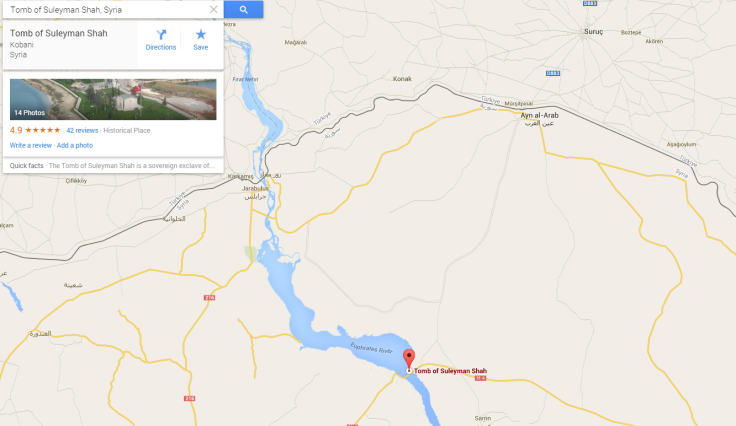Syria: Will Turkey Go to War with Isis over Tomb of the Grandfather of the Ottoman Empire?

An ancient tomb housing the grandfather of the founder of the Ottoman Empire, Suleyman Shah, is an extraterritorial Turkish enclave nestled in Syria, could be a game-changer in the military campaign against Isis (also known as Islamic State).
As the Turkish parliament voted to give the government new powers to launch a military assault in Syria and Iraq, reports that IS militants have besieged Turkish troops guarding the pocket of territory have spread.
Pro-government paper Yeni Safak reported more than 1,000 Sunni militants have surrounded the tomb and cut the escape routes. Other reports claimed IS kidnapped some Turkish special forces personnel.
The tomb, situated 30km (20 miles) from the border, has been on Turkish soil under a treaty signed with France in 1921, when France ruled Syria.
While denying reports that Turkish troops are under siege, President Recep Tayyip Erdogan confirmed what Turkish officials have been saying since the beginning of this year: the tomb is considered sovereign territory and any attack on the mausoleum will cause be considered an attack on Turkey.
"It is clear what steps we will take if something happens to the tomb," he said. "This remains for us a sensitive issue."
The Grandfather of the Ottoman Empire
Deputy Prime Minister Bulent Arinc confirmed IS had been gaining ground on the territory. Turkey has been reluctant to join US-led coalition against IS despite the ally's insistence. Its main concern was linked to the possibility of Turkish and Syrian Kurds fighting together against IS, laying out the foundation of a future independent state.
However, an IS attack on Suleyman Shah's tomb may change the destiny of the war on Isis. The grandfather of Osman I, who founded the foundation of the Ottoman Empire in 1299, Shah drowned in the Euphrates near Ja'bar, according to historians. He was the leader of the Kayi tribe, which later settled in Anatolia, the core of the future Ottoman Empire.

The first time the tomb made the news was in March, when the then-foreign minister Ahmet Davutoglu, now prime minister, said Turkey would intervene in the Syrian Civil War should the tomb be attacked.
A high-level security meeting's recording discussing the possibility of a military operation in Syria was leaked and was uploaded on YouTube. In the leaked footage, Turkey's intelligence chief Hakan Fidan is seen in discussion with with Davutoglu, Deputy Chief of Staff Yasar Guler and other officials over a possible operation in Syria to secure the tomb. It was alleged that Turkey moved to ban YouTube in the country after the recording went online.
Turkish Special Troops left stranded
According to Al-Monitor website, in March Turkey replaced inexperienced conscripts guarding the tomb with 50 or 60 elite troops from the Turkish Special Forces command, with previous experience in anti-terrorist operation.
In the past weeks, IS launched an assault to the Kurdish region of Kobani, in northern Syria, sending shockwaves to Turkey. The Sunni militants' offensive caused 150,000 Syrian Kurds to flee to Turkey, putting pressure on the Nato member to intervene.
The personnel at the tomb reportedly lost contact with local elements that helped them with logistics and intelligence. Conditions are dire, with limited electricity, water and food supplies.
After the release of Turkish hostages by IS, families of the military deployed at the tomb have questioned why they had not been evacuated.
Security experts contacted by Al-Monitor argued the Turkish government "is keeping the Turkish army in check while using the presence of the troops at the tomb to justify intervention in Syria".
"In short, the tomb is needed by the Turkish government to keep the army in check and to motivate it to enter Syria; to obtain support of the public after the parliamentary approval; and, finally, to better defend in the international arena its justification for intervening in Syria," it said.
Turkish leaders have proposed a border buffer zone to include ground troops and a no-fly zone over the border area but those suggestions have been met coldly by Kurds and Americans.
© Copyright IBTimes 2025. All rights reserved.






















